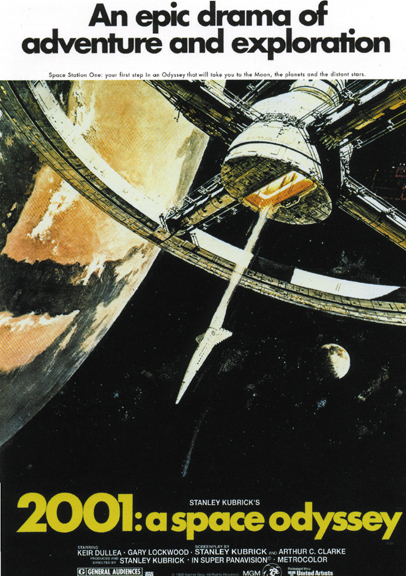 |
Film review
2001: A Space Odyssey
by Stanley Kubrick
By Penelope Yau

2001: Space Odyssey is no ordinary science fiction movie. It is just the kind of film that you either love or hate.
Those who hate 2001 complain about its lack of dialogue and its unusually slow pace. The first spoken word does not appear until almost 30 minutes into the film, and there is less than 40 minutes of dialogue in the 139-minute movie.
Also, unlike conventional Hollywood movies, this film offers no resolution at the end, nor does it promise a happily-ever-after sort of ending that is so popular among typical Hollywood productions.
Those who love 2001 are astounded by the dazzling and almost breathtaking visual and musical elements in the movie.
To achieve greater visual authenticity and technical accuracy, director Stanley Kubrick hired spacecraft consultants Frederick Ordway and Harry Lange to assist in the film direction. The consultants had helped NASA develop advanced space vehicle concepts.
Even today, many people still find that the settings and spaceships in 2001 are more authentic and convincing than those in many of the later science fiction movies.
What makes the film even more remarkable is Kubrick’s ability to weave complex philosophical themes with the stunning visuals.
2001 is often regarded as one of the most thought-provoking movies ever made in film history. It certainly is.
“What he (Stanley Kubrick) had actually done was make a philosophical statement about man’s place in the universe, using images as those before him had used words, music or prayer,” wrote Roger Ebert, a film critic at the Chicago Sun-Times in 1997.
One of the main themes that resonates throughout the film is human beings’ over-reliance on science and technology. In the movie, HAL 9000, the greatest of all computers, is said to be invincible and “incapable of error”. But ironically, the foolproof computer suffers internal errors and kills everyone on board, except Dave, played by Keir Dellea. Dave later disconnects HAL with a screwdriver.
The failure of HAL 9000 is symbolic, for it represents the ultimate failure of science and technology. It shows that we have come to depend on technology so much that we are blind to its mind-numbing and dehumanizing effects. Kubrick addresses this problem in a highly satiric way – by creating a role reversal of men and computers.
In 2001, computers take on a curiously and surprisingly human form. In many ways, HAL 9000 is better and more humane than us. He is programmed to be capable of genuine human emotions. We sympathize with him when Dave disconnects him. In that particular scene, which is considered one of the most moving scenes in the movie, we almost feel his desperation when he cries and begs Dave in remorse, “Dave, stop. Stop, will you? Stop, Dave. Will you stop, Dave? Stop, Dave. I’m afraid. I’m afraid, Dave. Dave, my mind is going. I can feel it. I can feel it. My mind is going. There is no question about it. I can feel it. I can feel it. I can feel it. I’m afraid. . . .”
We are masters of the earth, but in space, we are like fish out of water. We need oxygen masks to help us breathe, and without gravity, we have to learn to walk all over again. Think about this carefully. Is this what you really want?
We dream of traveling into space. But ask yourself these questions: Do you really want to travel into space? Or is what you really want, rather, just the glory of being able to travel to space?
Kubrick
made 2001 in the 1960s, in the midst of the space race between
the then superpowers, U.S.A. and U.S.S.R. With China launching its first
astronaut into space in October this year, 2001 may become
relevant today once again.
Home